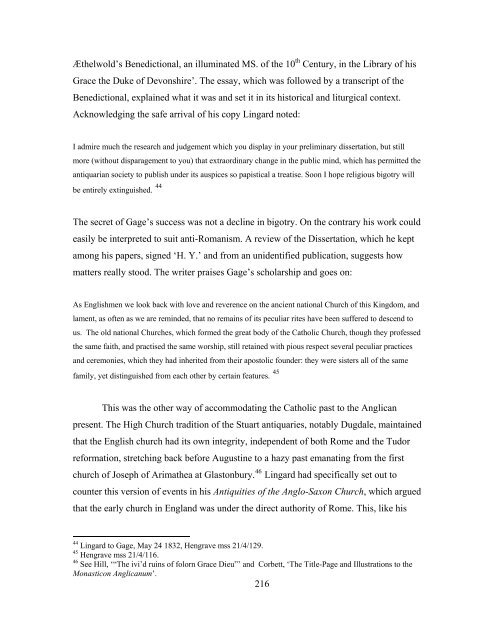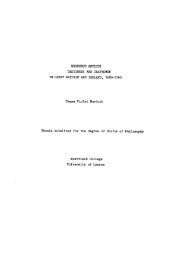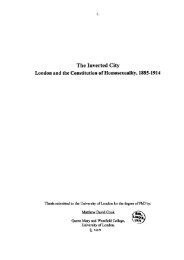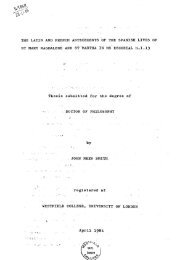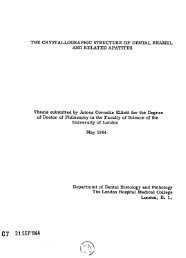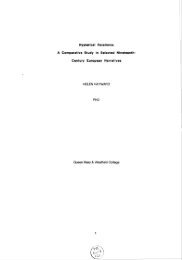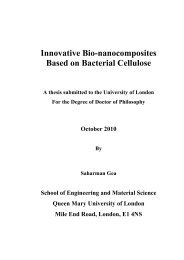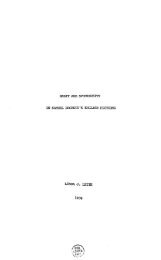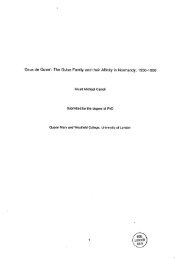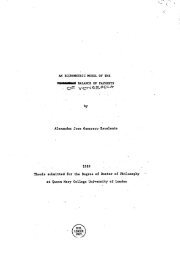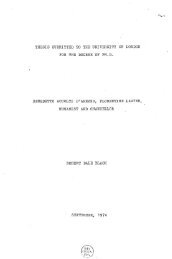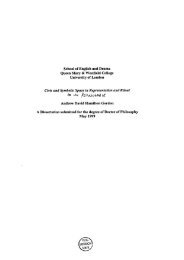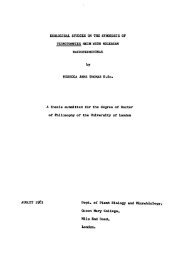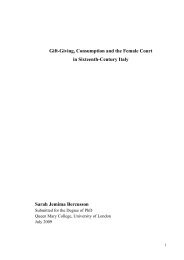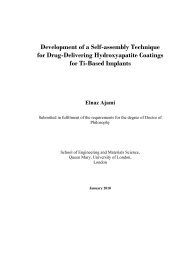Antiquaries in the Age of Romanticism: 1789-1851 - Queen Mary ...
Antiquaries in the Age of Romanticism: 1789-1851 - Queen Mary ...
Antiquaries in the Age of Romanticism: 1789-1851 - Queen Mary ...
Create successful ePaper yourself
Turn your PDF publications into a flip-book with our unique Google optimized e-Paper software.
Æ<strong>the</strong>lwold’s Benedictional, an illum<strong>in</strong>ated MS. <strong>of</strong> <strong>the</strong> 10 th Century, <strong>in</strong> <strong>the</strong> Library <strong>of</strong> his<br />
Grace <strong>the</strong> Duke <strong>of</strong> Devonshire’. The essay, which was followed by a transcript <strong>of</strong> <strong>the</strong><br />
Benedictional, expla<strong>in</strong>ed what it was and set it <strong>in</strong> its historical and liturgical context.<br />
Acknowledg<strong>in</strong>g <strong>the</strong> safe arrival <strong>of</strong> his copy L<strong>in</strong>gard noted:<br />
I admire much <strong>the</strong> research and judgement which you display <strong>in</strong> your prelim<strong>in</strong>ary dissertation, but still<br />
more (without disparagement to you) that extraord<strong>in</strong>ary change <strong>in</strong> <strong>the</strong> public m<strong>in</strong>d, which has permitted <strong>the</strong><br />
antiquarian society to publish under its auspices so papistical a treatise. Soon I hope religious bigotry will<br />
be entirely ext<strong>in</strong>guished. 44<br />
The secret <strong>of</strong> Gage’s success was not a decl<strong>in</strong>e <strong>in</strong> bigotry. On <strong>the</strong> contrary his work could<br />
easily be <strong>in</strong>terpreted to suit anti-Romanism. A review <strong>of</strong> <strong>the</strong> Dissertation, which he kept<br />
among his papers, signed ‘H. Y.’ and from an unidentified publication, suggests how<br />
matters really stood. The writer praises Gage’s scholarship and goes on:<br />
As Englishmen we look back with love and reverence on <strong>the</strong> ancient national Church <strong>of</strong> this K<strong>in</strong>gdom, and<br />
lament, as <strong>of</strong>ten as we are rem<strong>in</strong>ded, that no rema<strong>in</strong>s <strong>of</strong> its peculiar rites have been suffered to descend to<br />
us. The old national Churches, which formed <strong>the</strong> great body <strong>of</strong> <strong>the</strong> Catholic Church, though <strong>the</strong>y pr<strong>of</strong>essed<br />
<strong>the</strong> same faith, and practised <strong>the</strong> same worship, still reta<strong>in</strong>ed with pious respect several peculiar practices<br />
and ceremonies, which <strong>the</strong>y had <strong>in</strong>herited from <strong>the</strong>ir apostolic founder: <strong>the</strong>y were sisters all <strong>of</strong> <strong>the</strong> same<br />
family, yet dist<strong>in</strong>guished from each o<strong>the</strong>r by certa<strong>in</strong> features. 45<br />
This was <strong>the</strong> o<strong>the</strong>r way <strong>of</strong> accommodat<strong>in</strong>g <strong>the</strong> Catholic past to <strong>the</strong> Anglican<br />
present. The High Church tradition <strong>of</strong> <strong>the</strong> Stuart antiquaries, notably Dugdale, ma<strong>in</strong>ta<strong>in</strong>ed<br />
that <strong>the</strong> English church had its own <strong>in</strong>tegrity, <strong>in</strong>dependent <strong>of</strong> both Rome and <strong>the</strong> Tudor<br />
reformation, stretch<strong>in</strong>g back before August<strong>in</strong>e to a hazy past emanat<strong>in</strong>g from <strong>the</strong> first<br />
church <strong>of</strong> Joseph <strong>of</strong> Arima<strong>the</strong>a at Glastonbury. 46 L<strong>in</strong>gard had specifically set out to<br />
counter this version <strong>of</strong> events <strong>in</strong> his Antiquities <strong>of</strong> <strong>the</strong> Anglo-Saxon Church, which argued<br />
that <strong>the</strong> early church <strong>in</strong> England was under <strong>the</strong> direct authority <strong>of</strong> Rome. This, like his<br />
44<br />
L<strong>in</strong>gard to Gage, May 24 1832, Hengrave mss 21/4/129.<br />
45<br />
Hengrave mss 21/4/116.<br />
46<br />
See Hill, ‘“The ivi’d ru<strong>in</strong>s <strong>of</strong> folorn Grace Dieu”’ and Corbett, ‘The Title-Page and Illustrations to <strong>the</strong><br />
Monasticon Anglicanum’.<br />
216


